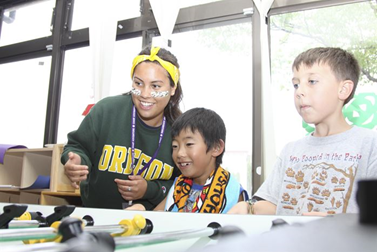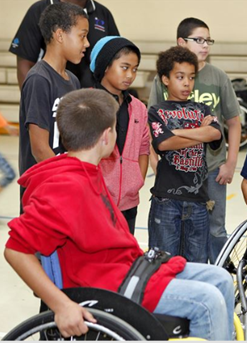16.4: Principles
The following are five Principles that reflect contemporary theories and research evidence concerning children’s play and learning. In school-age care settings, these principles underpin practice that is focused on collaborating with all children.
1. Secure, respectful, and reciprocal relationships
Mutually supportive relationships are very important in school-age care settings. Secure, respectful and reciprocal relationships between children, between children and adults, and amongst adults provide the foundation upon which the community in school-age care settings is established. When children feel safe, secure, respected and given appropriate responsibility they feel like valued members of the school-age care community. Children, who are supported to understand themselves in this positive way, experience a sense of belonging that nurtures the development of their self-esteem. Self-esteem is critical to children’s capacity to develop positive images about their abilities, interests and personal future.

2. Partnerships
School-age children are involved in a range of activities throughout their day. Children have the potential to be affected by people, places and events. Families, schools and local communities contribute to the opportunities provided for this age group. Children feel positive when there are strong links between these settings and positive outcomes are most likely to be achieved when educators work in partnership with these contributors. Educators also recognize and explore community activities. These partnerships shape children’s dispositions towards citizenship.
Educators recognize that families are children’s first and most influential teachers. They create a welcoming environment where all children and families are respected and actively encouraged to collaborate with educators about program decisions in order to ensure that experiences are meaningful. Further, educators recognize the school setting and the significance of the learning and teaching opportunities provided for children. They are sensitive to the conduit role they provide between families and schools.

Partnerships are based on effective communication, which builds the foundations of understanding about each other’s expectations and attitudes, and build on the strength of each others’ knowledge. In genuine partnerships, children, families, schools, communities and educators:
- value each other’s knowledge
- value each other’s contributions to and roles in children’s life
- trust each other
- communicate freely and respectfully with each other
- share insights and perspectives with and about children
- engage in shared decision-making.
3. High Expectation and Equity
School-age care educators who are committed to equity believe in all children’s capacities to access opportunities and succeed, regardless of diverse circumstances and abilities. They nurture children’s optimism, happiness and sense of fun. Children progress well when they, their parents, educators and the community hold high expectations for achievements and contributions to society.
Educators recognize and respond to barriers to children achieving a positive self-identity, sense of purpose and positive view of personal future. In response, they challenge practices that contribute to inequities and make decisions that promote inclusion and participation of all children. By developing their professional knowledge and skills, and working in partnership with children, families, communities, other services and agencies, they continually strive to find equitable and effective ways to ensure that all children have opportunities to experience a sense of personal worth and achieve outcomes.

4. Respect for Diversity
There are many ways of living, being and of knowing. Children are born belonging to a culture, which is not only influenced by traditional practices, heritage and ancestral knowledge, but also by the experiences, values and beliefs of individual families and communities. Being aware of and understanding diversity in school-age care means taking into account the context of different family practices, values and beliefs. Educators endeavor to understand the histories, cultures, languages, traditions, child rearing practices and lifestyle choices of families so they can better support children in their care. They value children’s different capacities and abilities.
Educators recognize that diversity contributes to the richness of our society and provides a valid evidence base about ways of knowing. When school-age care educators respect the diversity of families and communities, and the aspirations they hold for children, they are able to nurture children’s well-being and foster children’s development. They make program decisions that uphold all children’s rights to have their cultures, identities, abilities and strengths acknowledged and valued, and respond to the complexity of children’s and families’ lives.
Educators think critically about opportunities and dilemmas that can arise from diversity and take action to redress unfairness. They provide opportunities to explore similarities and differences and consider interdependence and how we can learn to live together.
A Culturally Responsive Environment
According to Matthew Lynch, in an Education Week blog post, one way that educators can incorporate cultural awareness is to “express interest in the ethnic background of your students. Encourage your students to research and share information about their ethnic background as a means of fostering a trusting relationship with fellow classmates. Analyze and celebrate differences in traditions, beliefs, and social behaviors. It is of note that this task helps European-American students realize that their beliefs and traditions constitute a culture as well, which is a necessary breakthrough in the development of a truly culturally responsive classroom. Also, take the time to learn the proper pronunciation of student names and express interest in the etymology of interesting and diverse names.”[1]
5. Ongoing Learning and Reflective Practice
Educators continually seek ways to build their professional knowledge and develop learning communities. They collaborate with children, families and communities, and value the continuity and richness of local knowledge shared by community members.
Reflective practice is a form of ongoing learning that involves engaging with questions of philosophy, ethics and practice. Its intention is to gather information and gain insights that support, inform and enrich decision-making about children’s well-being and development. As professionals, educators examine what happens in their settings and reflect on what they might change.
Critical reflection involves closely examining all aspects of events and experiences from different perspectives. Educators often frame their reflective practice within a set of overarching questions, developing more specific questions for particular areas of inquiry.
Overarching questions to guide reflection include:
- What are my understandings of each child?
- What theories, philosophies and understandings shape and assist my work?
- Who is advantaged when I work in this way? Who is disadvantaged?
- What questions do I have about my work? What am I challenged by? What am I curious about? What am I confronted by?
- What aspects of my work are not helped by the theories and guidance that I usually draw on to make sense of what I do?
- Are there other theories or knowledge that could help me to understand better what I have observed or experienced? What are they? How might those theories and that knowledge affect my practice?
A lively culture of professional inquiry is established when educators and those with whom they work are all involved in an ongoing cycle of review through which current practices are examined, outcomes reviewed, and new ideas generated. In such a climate, issues relating to program quality, environment design, equity and children’s well-being can be raised and debated.

- Lynch, M. (2014). 6 Ways Teachers Can Foster Cultural Awareness in the Classroom. Education Week. Retrieved from https://mobile.edweek.org/c.jsp?cid=25920011&item=http%3A%2F%2Fapi.edweek.org%2Fv1%2Fblogs%2F155%2F%3Fuuid%3D43288 ↵

